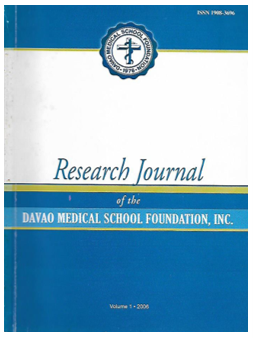AUTHOR
Erwin Rommel N. Hontiveros, MD, MHPEd
KEYWORDS:
medical students, community immersion, interpersonal skills assessment
ABSTRACT
This study explored the effects of communityimmersion on the interpersonal skills (IPS) of the 2003-2004 batch of DMSFI clerks with patients during medical interviews. The IPS of 58 fourth year clerks during medical interviews with patients were compared in terms of hospital assignment, department rotation, and community immersion experience. In addition, a group of 14 clerks among them were the subject of a time series observation for IPS behaviros during medical interviews conducted while on pre-community immersion, during community immersion, and post-community immersion. Two separate checklists for IPS developed by Mencias (1991) were used by trained observers and on randomly selected patients to assess the IPS behaviors of the clerks. Based on their mean performance, the 58 clerks rotated in private hospitals performed betteer on IPS as compared to clerks rotated in the public hopsitals (p<0.001). This study found no significant difference in performance on IPS among clerks rotated in Internal Medicine, Obstetric-Gynecology, Pediatrics, and EENT-Dermatology (p=0.105). Similarly, there was no significant difference in performance on IPS among clerks who had undergone community immersion and those who were yet to undergo community immersion(p=0.563). Improvement in IPS was observed in the 14 clerks during community immersion and post-community immersion as against their performance during pre-community immersion. In the teaching hospitals, frequent experiences of history taking, explaining clinical procedure, and doing progress notes were cited as IPS enhancers, while lack of rest, excessive workload, the asbsence of role models, and less trust by patients were cited as IPS inhibitors. In community immersion, on the other hand, IPS enhancers included the absence of clinical preceptors, doing routine hisotry taking, helath program lectures, and community diagnosis, and experiencing community life. The clerks’ IPS were inhibited by the lack of interest by rural residents, their limited stay in the community, and difficulty adjusting to community life. This study recommended that patients be involved in the interview assessment of medical students to provide them with relevant and specific feedback and learner support to develop their interview skills. Clinical preceptors and more clerk-patient contact at the community level should also be provided. Further study should be done to examine why empthy gradually declined while accepteance gradually improved during and after community immersion.


